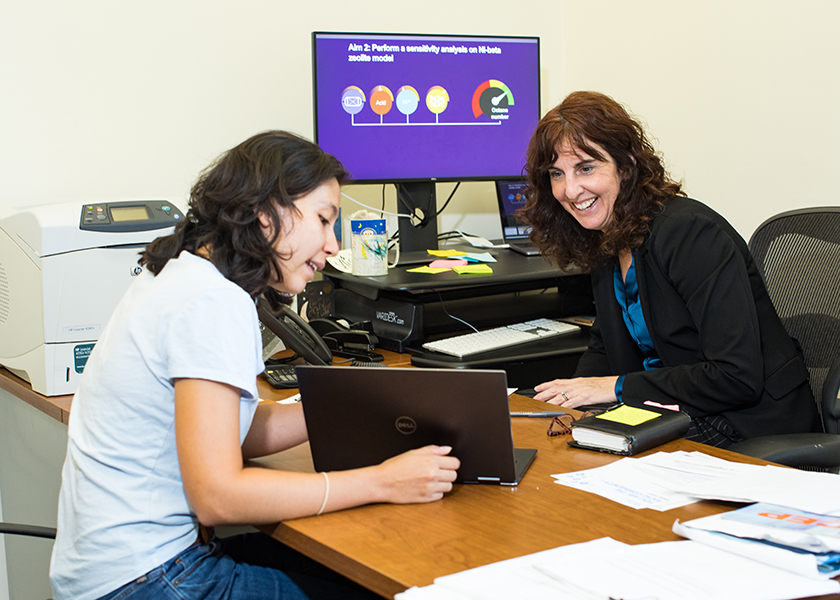Seeking Sustainable Solutions
Linda Broadbelt tackles one of the world’s most pressing challenges: the global plastics crisis
A daring, enterprising energy blankets the work of Northwestern Engineering faculty member Linda Broadbelt.
Over the years, Broadbelt, Sarah Rebecca Roland Professor in the Department of Chemical and Biological Engineering, has tackled diverse issues such as shale gas conversion and artwork degradation and teamed up with fellow researchers and industry players representing energy, medicine, and manufacturing.
Now, Broadbelt is pursuing a new ambitious target: the global plastics crisis.
While durable and useful, plastics have proven to be detrimental to the environment and human health when left unchecked: contributing greenhouse gases to the environment, disrupting terrestrial and aquatic wildlife, and linked to cancers and changing hormone activity.
“The plastics crisis is one of the biggest problems we’re facing as a global society,” said Broadbelt, who will celebrate her 30th year on the Northwestern Engineering faculty in 2024.

Last year, a report from the international Organisation for Economic Co-operation and Development noted that the world’s plastic consumption had quadrupled over the past 30 years. The more troubling finding, however, was that only 9 percent of plastic was successfully recycled, meaning the bulk of plastic waste was dumped into landfills, incinerated, or leaked into the environment.
In her typical collaborative, innovative fashion, Broadbelt is attacking the plastics conundrum on two fronts.
First, Broadbelt is investigating ways to capture value from existing plastics. Her work steering the Responsible Innovation for Highly Recyclable Plastics (ResIn) team featuring scientists from Northwestern and the Paula M. Trienens Institute For Sustainability And Energy, Argonne National Laboratory, Dow Chemical Company, Michelin, and Fenner Precision has included studying new and improved recycling and recovery processes, including solvolysis – a chemical process using solvents to break polymers into monomers – and thermal reprocessing of network polymers. While continuing to explore replacement materials, Broadbelt and collaborators are also examining pyrolysis, a process by which plastic waste is converted into chemicals and energy that can handle mixtures of polymers, including any additives.
While recycling and recovery efforts hold merit given the need for more immediate action on plastic waste, Broadbelt is among many championing a complete paradigm shift in plastics design. This includes contributing to the development of Pickaxe, an open-source software platform that predicts novel metabolic and chemocatalytic reactions and compounds to inform the design of new polymers.
“Plastics today are not necessarily designed to be recycled, so can we think about recycling up front while still meeting the properties we covet?” Broadbelt said.
There are significant environmental and human health implications if we continue down our current path of creating today’s polymers. There’s a need for new solutions, and I’m enjoying these partnerships with smart, passionate people working toward that mission.
Alongside partners from industry and academia, including Northwestern Engineering colleagues such as John Torkelson, Keith Tyo, Jennifer Dunn, and Tobin Marks, Broadbelt is using pathway design methods to find molecules that can be produced from biomass resources rather than petroleum. Thereafter, she and partners are using computer generation of polymers, machine learning, and artificial intelligence to evaluate if the properties of the newly concocted polymers can serve as alternatives to incumbents.
“By keeping the full lifecycle in mind and invoking reaction pathway analysis at every stage, we can ensure polymers get back to their starting point,” said Broadbelt, who is also a member of the Bio-Optimized Technologies to keep Thermoplastics out of Landfills and the Environment (BOTTLE) consortium, a US Department of Energy-initiated group of researchers from national labs and universities developing new chemical upcycling strategies for current plastics as well as novel plastics incorporating recycling into the design.
Despite existing social and financial barriers, Broadbelt remains optimistic she and her collaborators representing distinct disciplines and institutions can deliver solutions to a pressing global problem.
“There are significant environmental and human health implications if we continue down our current path of creating today’s polymers,” she said. “There’s a need for new solutions, and I’m enjoying these partnerships with smart, passionate people working toward that mission.”